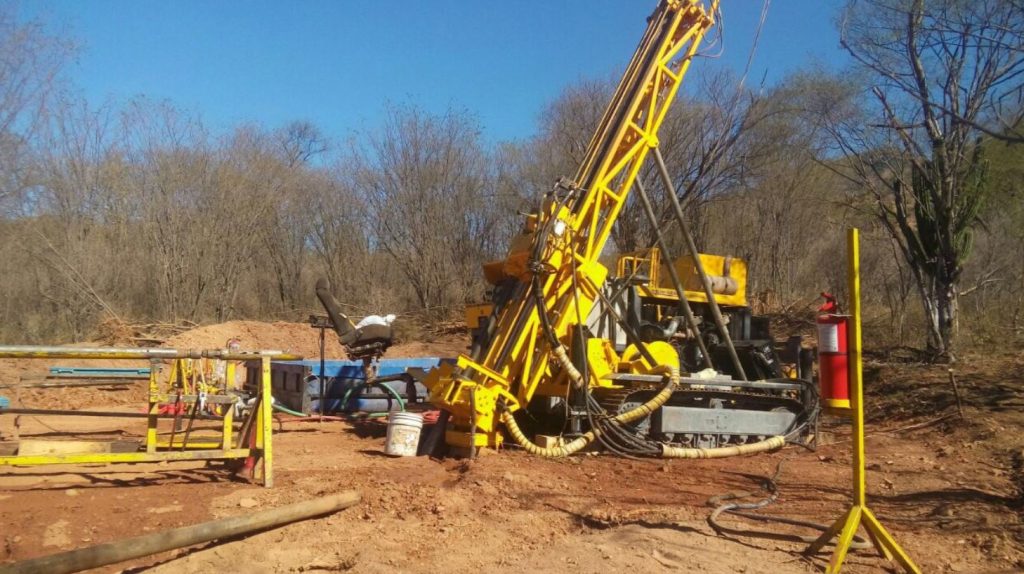Aztec Minerals drills 0.42 g/t gold over 57 metres at Cervantes, Mexico

Aztec Minerals Corp. [TSXV-AZT; OTCQB-AZZTF] reported additional gold results from the recently completed reverse circulation (RC) exploration drilling program conducted in the fourth quarter of 2023 at the California gold zone of the Cervantes project in Sonora, Mexico.
Results of the final 10 of the total 13 RC drill holes, CAL23-035 to CAL23-044, continued to show intersections of gold mineralization in the altered California intrusive porphyry complex, extending the California gold zone to the west, north, south and east, as well as to depth.
Results for hole CAL23-041, a step-out extending the California zone to the West, returned 57.76 metres grading 0.42 g/t gold. The results from all final ten RC drill holes encountered the gold mineralized and altered California intrusive complex.
California zone drill highlights: CAL23-035 returned 47.12 metres at 0.51 g/t gold. CAL23-041 returned 57.76 metres at 0.42 g/t gold. CAL23-044 returned 59.44 metres at 0.28 g/t gold.
Drilling toward the West and Northwest of the California zone targeted the edge of an airborne magnetic low that the California gold porphyry mineralization appears related to. Drilling has expanded the knowledge of the system, including support of the concept that much of the metasediments intersected are unconnected blocks as xenoliths within the California intrusive porphyry complex as relicts of its piercement by its uppermost levels.
It is also being shown that the metasediments, specifically the quartzites, can host gold mineralization which hadn’t been well evidenced before. Surface reconnaissance confirmed that the mineralized and altered quartz feldspar porphyry and hydrothermal breccias continue to the east for at least another 400 metres. To date, every hole except one drilled at the California zone has intersected near surface, oxidized gold mineralization with minor copper values.
The primary focus of the Phase 3A RC drilling program at Cervantes was to expand the previously drilled California zone and towards the California North and Jasper zones, and to enhance geologic understanding of the targets. The Phase 3A RC drilling program at Cervantes was comprised of 13 RC holes totaling 1,630.7 metres drilled at California. The program was conducted in the end of the rainy season with no injuries or accidents.
Holes CAL23-035 to 044 intersected extensive gold related mineralization and alteration, extending the known mineralized zone to the north and west and at depth. The California intrusive porphyry complex including the California and California Norte zones as drilled measures approximately 1,000 metres long east-west by 730 metres wide, with demonstrated, continuous mineralization of up to 170 metres depth. The porphyry gold-copper mineralization is still open in all directions.
The planned testing of the California zone of the Cervantes phase 3A RC drilling program is complete. The primary objectives of the 2021-to-2024 exploration program are to better define the open pit, heap leach gold potential of the porphyry oxide cap at California, evaluate the potential for deeper gold-copper porphyry sulphide mineralization underlying the oxide cap, test for north and west extensions of the California mineralization.
In 2024 it is planned for further technical studies, reconnaissance work on other targets, metallurgical testing and the Cervantes phase 3B RC drilling program of approximately 20 drill holes comprising 2,850 metres, including California North and Jasper.
Now that drilling has concluded and as it is the dry season, Aztec plans to carry out reconnaissance and channel sampling and geologic mapping of the new drill roads at California, and other targets around the target area to expand surface sampling and mapping on the property in general to continue the 2021-to-2023 surface exploration program.
